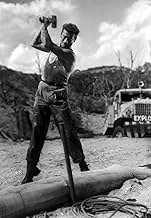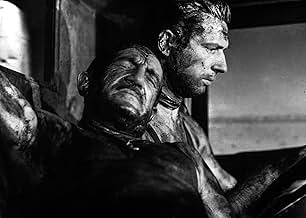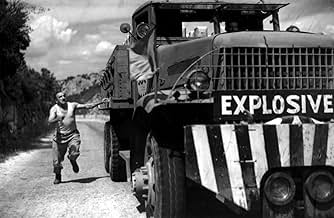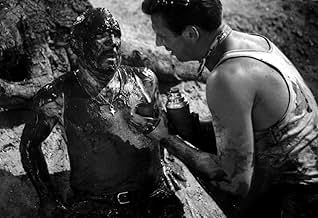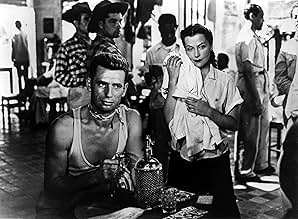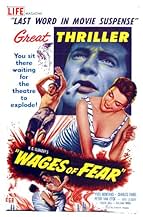In a decrepit South American village, four men are hired to transport an urgent nitroglycerine shipment without the equipment that would make it safe.In a decrepit South American village, four men are hired to transport an urgent nitroglycerine shipment without the equipment that would make it safe.In a decrepit South American village, four men are hired to transport an urgent nitroglycerine shipment without the equipment that would make it safe.
- Director
- Writers
- Stars
- Won 1 BAFTA Award
- 6 wins & 1 nomination total
Peter van Eyck
- Bimba
- (as Peter Van Eyck)
Véra Clouzot
- Linda
- (as Vera Clouzot)
Darío Moreno
- Pepito Hernandez
- (as Dario Moreno)
Antonio Centa
- Camp Chief
- (as Centa)
Charles Fawcett
- Bradley
- (uncredited)
- Director
- Writers
- All cast & crew
- Production, box office & more at IMDbPro
Summary
Reviewers say 'The Wages of Fear' is a gripping film about desperation and survival, with intense suspense and masterful direction by Henri-Georges Clouzot. Critics praise Yves Montand and Charles Vanel's performances and the exploration of human resilience. Some find the initial setup slow and criticize the portrayal of the American oil company. Despite this, the film is celebrated for its innovative cinematography and thematic depth.
Featured reviews
You're living in a barren, beaten land, in South America where the lost and lonely band, no way to pay for your escape, the barrels bottom is all you scrape, this ain't the dream that had been promised, or been planned. Then your offered a way out, a chance to flee, there's a price to pay but soon you could be free, if you drive a laden lorry, you can wrap yourself in glory, $2000 you'll receive as the payee.
If only driving a wagon a few hundred miles was all there was to it. A fantastic piece of film making that demonstrates how far people can sink and what boundaries they're prepared to cross to extricate themselves from those depths.
If only driving a wagon a few hundred miles was all there was to it. A fantastic piece of film making that demonstrates how far people can sink and what boundaries they're prepared to cross to extricate themselves from those depths.
Clouzot rarely gets the attention he deserves. He made not one, but two of the greatest thrillers of all time, 'Les Diaboliques' and 'The Wages Of Fear', both perfect examples of how to make genuinely suspenseful movies that build up an amazing amount of tension. Most so-called thrillers made in Hollywood these days are thrillers in name only and could learn a lesson or two from these movie classics. 'The Wages Of Fear' could even be described as an action movie, but it is a CHARACTER DRIVEN action movie, and that's what makes it so special. Modern audiences with MTV attention spans might find the plot a little slow, but I think the first half of the movie, which deals with the motley collection of exiles in a poor Latin American town, is not only fascinating in itself, but really makes a massive impact on the second half. By taking his time introducing the characters and exploring their relationships and possible motivations, Clouzet adds depth and meaning to the rest of the exciting story, something very rarely achieved in this type of movie since. The cast, every single one of them, are flawless. The four leads, Mario, the fairly decent guy played by yves Montand, his new best friend the shifty M. Jo (Charles Vanel), his old pal the kind hearted Luigi (Folco Lulli), and the enigmatic Bimba (Peter van Eyck), are all brilliant. Great performances, taut and imaginative direction, crisp and impressive cinematography, and a handful of the most riveting sequences ever committed to film make 'Wages Of Fear' a truly unforgettable experience. Suspense movies don't come much better than this! Simply a masterpiece.
In the opening scene of Wages of Fear (1953), director Georges Henri-Clouzot provides an inkling of the kind of claustrophobic ride we are in for. In a steamy, impoverished Latin American town called Las Piedras, insects grope clumsily in the dust, struggling to escape the strings that children have tied to them. People from all over the world congregate in the streets and bars and the air is thick with choking dust. Clouzot makes clear the desperation of the residents, "It's like prison," explains one of them. "Easy to get in, but escape is impossible." The Southern Oil Company (SOC - same initials as Standard Oil) runs the town and enjoys its profits while the villagers are compelled to work odd jobs just to stay alive. After a fire breaks out at one of the oil fields killing many workers, the anti-union American boss seeks experienced drivers from among the townspeople to put out the fire. It is here that the anti-American flavor runs thick and where much of this part of the film was originally excised for American audiences (but has since been restored).
Four men, desperate to escape their trap, agree to drive a truck loaded with nitroglycerine 300 miles over treacherous mountain roads in the hot sun for the sum of $2000 each. Transporting the nitroglycerine for them is a way out of hopelessness -- either through a big paycheck or through sudden death, with the latter appearing the more probable. Though sadly past the point in time when we can still be shocked over gangster capitalism and men selling out for money, the story is nonetheless compelling. The four who are chosen to go on this fool's errand include Mario, a young Corsican played by Yves Montand in a role that brought him widespread attention. He is carrying on an affair with a local servant girl, Linda (Vera Clouzot) who is in love with him. His treatment of her, however, is atrocious and reflects the attitude of the male-dominated society they live in. Also picked to drive one of the trucks is Jo, an aging Parisian small-time crook (Charles Vanel), Luigi (Folco Lulli), an Italian with less than a year to live, and an ex-nazi pilot (Peter van Eyck). This unlikely group will play a cat-and-mouse game with death for the remainder of the film.
Clouzot depicts several incidents that bring the tension to the boiling point. In the first one, the trucks must travel at least 40 mph over a pot-holed stretch of road to prevent the vibrations from setting off the nitroglycerine. The second involves a sharp, narrow turn that requires the trucks to back up onto an unstable, rotten wooden platform causing it to buckle. Almost immediately afterwards, the trucks are stopped by a huge boulder in the middle of the road and must siphon off some of the nitroglycerine to blow it up. Finally, Mario must deftly maneuver the truck over a depression of spilled oil with the wheels stuck in reverse. As the long treacherous journey unfolds, roles are reversed between Mario and Jo as Mario becomes the strong dominant one and Jo, in Charles Vanel's brilliant performance, becomes shaken, fearful, and docile. Their relationship becomes the highlight of the film as the two become mutually dependent on each other for survival and comfort.
I found Wages of Fear to be an involving experience that kept me riveted throughout, though I did sense that there would not be a two and a half-hour film unless somebody survived. Although the unexpected plot twists were gripping, the best part of the film for me was the revelation of each character when faced with fear. It reminded me of the "Treasure of the Sierra Madre", a film that also showed men discovering the truth about themselves and others while pursuing their dream of wealth. Wages of Fear lived up to its accolades, but for me the discordant ending clashed both with the tone of the film and with my experience of the universe not as arbitrary or capricious but as filled with meaning and purpose.
Four men, desperate to escape their trap, agree to drive a truck loaded with nitroglycerine 300 miles over treacherous mountain roads in the hot sun for the sum of $2000 each. Transporting the nitroglycerine for them is a way out of hopelessness -- either through a big paycheck or through sudden death, with the latter appearing the more probable. Though sadly past the point in time when we can still be shocked over gangster capitalism and men selling out for money, the story is nonetheless compelling. The four who are chosen to go on this fool's errand include Mario, a young Corsican played by Yves Montand in a role that brought him widespread attention. He is carrying on an affair with a local servant girl, Linda (Vera Clouzot) who is in love with him. His treatment of her, however, is atrocious and reflects the attitude of the male-dominated society they live in. Also picked to drive one of the trucks is Jo, an aging Parisian small-time crook (Charles Vanel), Luigi (Folco Lulli), an Italian with less than a year to live, and an ex-nazi pilot (Peter van Eyck). This unlikely group will play a cat-and-mouse game with death for the remainder of the film.
Clouzot depicts several incidents that bring the tension to the boiling point. In the first one, the trucks must travel at least 40 mph over a pot-holed stretch of road to prevent the vibrations from setting off the nitroglycerine. The second involves a sharp, narrow turn that requires the trucks to back up onto an unstable, rotten wooden platform causing it to buckle. Almost immediately afterwards, the trucks are stopped by a huge boulder in the middle of the road and must siphon off some of the nitroglycerine to blow it up. Finally, Mario must deftly maneuver the truck over a depression of spilled oil with the wheels stuck in reverse. As the long treacherous journey unfolds, roles are reversed between Mario and Jo as Mario becomes the strong dominant one and Jo, in Charles Vanel's brilliant performance, becomes shaken, fearful, and docile. Their relationship becomes the highlight of the film as the two become mutually dependent on each other for survival and comfort.
I found Wages of Fear to be an involving experience that kept me riveted throughout, though I did sense that there would not be a two and a half-hour film unless somebody survived. Although the unexpected plot twists were gripping, the best part of the film for me was the revelation of each character when faced with fear. It reminded me of the "Treasure of the Sierra Madre", a film that also showed men discovering the truth about themselves and others while pursuing their dream of wealth. Wages of Fear lived up to its accolades, but for me the discordant ending clashed both with the tone of the film and with my experience of the universe not as arbitrary or capricious but as filled with meaning and purpose.
In The Wages of Fear, four men in a remote South American town have the enviable task of transporting a metric buttload (technical term) of nitroglycerin across mountainous roads in poor condition. It's a taut, superbly suspenseful thriller, guided with a steady hand by director Henri-Georges Clouzot, who would go on to direct the classic Diabolique in 1955.
Yves Montand, in a rare dramatic role, plays Mario, the ostensible protagonist of our tale. He's been stuck in this backwater for some time, but it costs a lot of money to get out – plane fares are through the roof, and there's no train, and there's no neighboring village. In short, you're stuck there until you can buy a ticket – and pay for a passport, of course.
Mario spends his days looking for work, wooing tavern worker Linda, and despairing about the lack of work. There's an American oil company in town, but they're no longer hiring. His monotonous lifestyle is interrupted by the arrival of fellow expat Jo (Charles Vanel), a tough-looking older man who quickly wins Mario's favor at the expense of the rest of the men in town.
The oil company, in fact, has its own problem – one of their large derricks has exploded, causing a huge oil fire. Company man Bill O'Brien decides to send two trucks loaded with nitro from the town up the mountain to the derrick. (The eventual idea is to set off charges, which will somehow contain or extinguish the fire.) O'Brien has no trouble scaring up volunteers for the task, since the men of the town are largely unemployed. Four men will be selected to take the two trucks. Only one truck is needed; the second is truly just in case there's an accident with the first one. The men will receive $2000 when the work is finished, more than enough to secure passage out of the backwater.
Mario and Jo are chosen, as are Mario's roommate Luigi (Folco Lulli) and German expat Bimba (Peter van Eyck). The two trucks depart early in the morning, full of gas and of nitro. Danger awaits.
Theirs is not an easy task. The road is full of ruts. In one place, the wooden deck that trucks use to make a sharp turn up the mountain has been damaged from disuse. It's hot and muggy. And one has to be very, very careful, as even the smallest bump might set the whole shebang off. There's also tension among the four drivers – Luigi is unhappy that Mario is spending more time with Jo than with him, Mario is unhappy with what he perceives as Jo's cowardice. Bimba seems to get along with everyone, though.
The whole time I was watching this movie, I was certain not all four were going to make it. I will not spoil what is now a sixty-three-year-old movie, but I was still genuinely surprised by the ending. This ain't no fairy tale or sitcom. This is a movie about desperation, redemption, sacrifice, and comeuppance. It's not necessarily about justice.
The Wages of Fear is a singularly terrific movie from start to finish, exquisitely shot and expertly written. Its money maker is its tension, something present here in spades. The writing is impeccable; even personality changes make perfect sense within the film's context. There are intricacies within a straightforward plot. This is a must see for lovers of thrillers.
Yves Montand, in a rare dramatic role, plays Mario, the ostensible protagonist of our tale. He's been stuck in this backwater for some time, but it costs a lot of money to get out – plane fares are through the roof, and there's no train, and there's no neighboring village. In short, you're stuck there until you can buy a ticket – and pay for a passport, of course.
Mario spends his days looking for work, wooing tavern worker Linda, and despairing about the lack of work. There's an American oil company in town, but they're no longer hiring. His monotonous lifestyle is interrupted by the arrival of fellow expat Jo (Charles Vanel), a tough-looking older man who quickly wins Mario's favor at the expense of the rest of the men in town.
The oil company, in fact, has its own problem – one of their large derricks has exploded, causing a huge oil fire. Company man Bill O'Brien decides to send two trucks loaded with nitro from the town up the mountain to the derrick. (The eventual idea is to set off charges, which will somehow contain or extinguish the fire.) O'Brien has no trouble scaring up volunteers for the task, since the men of the town are largely unemployed. Four men will be selected to take the two trucks. Only one truck is needed; the second is truly just in case there's an accident with the first one. The men will receive $2000 when the work is finished, more than enough to secure passage out of the backwater.
Mario and Jo are chosen, as are Mario's roommate Luigi (Folco Lulli) and German expat Bimba (Peter van Eyck). The two trucks depart early in the morning, full of gas and of nitro. Danger awaits.
Theirs is not an easy task. The road is full of ruts. In one place, the wooden deck that trucks use to make a sharp turn up the mountain has been damaged from disuse. It's hot and muggy. And one has to be very, very careful, as even the smallest bump might set the whole shebang off. There's also tension among the four drivers – Luigi is unhappy that Mario is spending more time with Jo than with him, Mario is unhappy with what he perceives as Jo's cowardice. Bimba seems to get along with everyone, though.
The whole time I was watching this movie, I was certain not all four were going to make it. I will not spoil what is now a sixty-three-year-old movie, but I was still genuinely surprised by the ending. This ain't no fairy tale or sitcom. This is a movie about desperation, redemption, sacrifice, and comeuppance. It's not necessarily about justice.
The Wages of Fear is a singularly terrific movie from start to finish, exquisitely shot and expertly written. Its money maker is its tension, something present here in spades. The writing is impeccable; even personality changes make perfect sense within the film's context. There are intricacies within a straightforward plot. This is a must see for lovers of thrillers.
9dtb
Georges Arnaud's novel LE SALAIRE DE LA PEUR has been filmed twice, by Henri-Georges Clouzot as THE WAGES OF FEAR (1953) and by William Friedkin as SORCERER (1977). While both films are worth seeing, the earlier version is the one regarded as a classic, and rightly so. Although SORCERER goes into more detail about the political climate and the various misdeeds that led the four desperate protagonists to the South American hellhole where they accept high-paying but life-risking jobs driving nitroglycerin through treacherous terrain, WAGES... distinguishes the men's personalities better, giving the audience more rooting interest in them. Both films have excellent casts, with charismatic leads in Yves Montand (WAGES...) and Roy Scheider (SORCERER), plus WAGES... also provides feminine charm in the form of beguiling Vera Clouzot as the café waitress who loves Montand. Both films have tense action sequences as well, but somehow for all the staging and skillful editing, SORCERER's action scenes seem strangely slow, slogging along in the mud just like the protagonists in their less-than-state-of-the-art trucks. Both versions have enough good things in them to be worth a look, but if you only have the time and resources to check out one of them, it's WAGES... that really pays off!
Storyline
Did you know
- TriviaYves Montand and Charles Vanel both suffered from conjunctivitis after filming in a pool of crude oil and being exposed to gas fumes.
- GoofsWhen Bimba is shaving in the cab of the truck, he has the right side of his face covered in shaving cream, but when he turns to talk to Luigi the right side of his face is clear of shaving cream.
- Alternate versionsThe film was cut for U.S. distribution in 1954, in part due to scenes that denounced crooked U.S. business interests in Latin America. The Criterion Collection laserdisc restored the film to its uncut version with 21 minutes of footage removed from other versions of the film.
- ConnectionsFeatured in Montand à la rencontre de Pagnol (1986)
- SoundtracksThe Blue Danube
Composed by Johann Strauss
Details
- Release date
- Countries of origin
- Languages
- Also known as
- El salario del miedo
- Filming locations
- Production companies
- See more company credits at IMDbPro
Box office
- Gross US & Canada
- $21,228
- Opening weekend US & Canada
- $7,633
- Dec 1, 2024
- Gross worldwide
- $22,326
- Runtime2 hours 36 minutes
- Color
- Aspect ratio
- 1.37 : 1
Contribute to this page
Suggest an edit or add missing content


![Watch Trailer [English SUB]](https://m.media-amazon.com/images/M/MV5BNWU5Zjk4MDAtZDM1Ni00YzJmLTkyZTUtYjVhN2VjNzZmOGVhXkEyXkFqcGdeQXRyYW5zY29kZS13b3JrZmxvdw@@._V1_QL75_UX500_CR0,47,500,281_.jpg)
